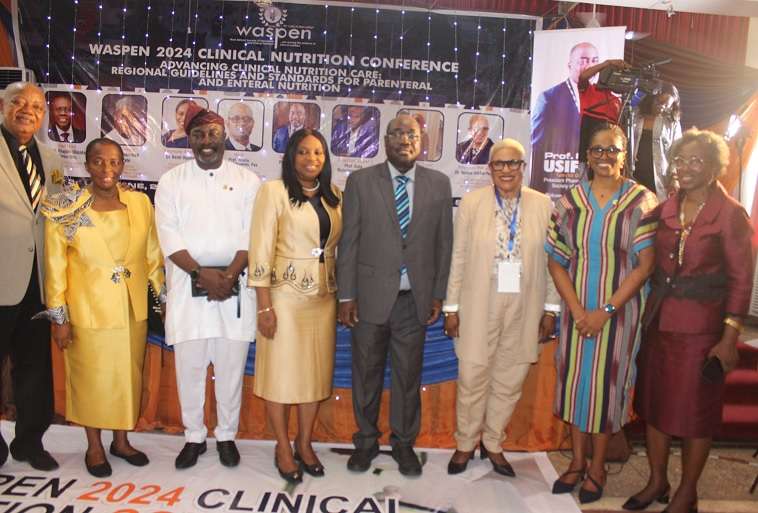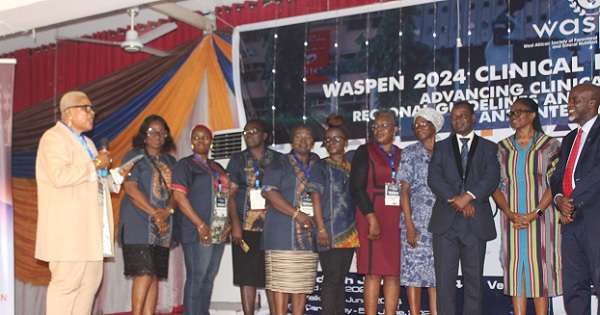
Healthcare professionals, including physicians, nurses, pharmacists, and dietitians, have advocated for improved clinical nutrition for patients to bridge gaps in malnutrition and reduce morbidity rates, especially among children. These experts gathered at the 2024 Edition of the West African Society of Parenteral and Enteral Nutrition (WASPEN) held at Hall 36 of the Lagos University Teaching Hospital (LUTH), where they highlighted the critical role of adequate nutrition in patient recovery and positive outcomes.
Acknowledging that adequate nutrition is a fundamental right, they lamented the unavailability of parenteral nutrition for critically ill patients who cannot absorb nutrients through oral feeding and require intravenous feeding through a nasogastric tube to the stomach or small intestine. They called for accelerated efforts from governments and practitioners to make parenteral and enteral nutrition available and affordable for patients.
Dr (Mrs) Kemi Ogunyemi, special adviser to Governor Babajide Sanwo-Olu on Health, was the keynote speaker. She emphasised the need for continuous clinical education and research to improve clinical nutritional care across the state and the country. Describing the conference theme, “Advancing clinical nutrition care: Regional guidelines and standards for parenteral and enteral nutrition,” as timely, she pointed out that the need for such nutrition is rising but often out of reach for the average person.
Statistics show that at least 1 in every 3 hospital patients will require clinical nutrition care to correct nutritional imbalances. Dr Ogunyemi highlighted the four steps involved in clinical nutritional care: Nutritional assessment, nutritional diagnosis, nutritional intervention, and monitoring and evaluation of nutritional care.
“Nutrition assessment begins with gathering adequate information to identify nutrition-related problems, including a physical assessment of the patients. Nutrition diagnosis involves identifying necessary interventions based on the patient’s history, signs, and symptoms. Nutrition intervention involves planned actions to positively change nutrition-related behavior, targeting the cause of the problem. Monitoring and evaluation determine whether the patient meets the nutritional intervention goals, requiring re-assessment to check progress,” Dr Ogunyemi explained.
At the conference, the president of the Nigerian Medical Association (NMA), Prof. Bala Audu, praised WASPEN Convener Dr Teresa Pounds for her initiative in advancing clinical nutrition. Represented by the first Vice-President, Dr Benjamin Olowojebutu, Prof. Audu, emphasised the need for policies to promote effective clinical nutrition for patients’ wellbeing.

Prof. Cyril Usifoh, president of the Pharmaceutical Society of Nigeria (PSN), also stressed the importance of adequate nutrition in ensuring the speedy recovery of hospitalised patients. He encouraged healthcare professionals to collaborate and pledged PSN’s support in ensuring pharmacists contribute to providing adequate nutrition for positive patient outcomes.
“We need to ensure that the average Nigerian, especially vulnerable groups like children, receive appropriate nutrition. The PSN is committed to working with the ministry and the government to achieve this goal,” Prof. Usifoh pledged.
Fielding questions from journalists, DrTeresa Pounds expressed her delight at seeing her vision materialise with a multi-disciplinary assembly of healthcare practitioners addressing clinical nutrition in Nigeria. She emphasised the importance of early screening to identify patients’ nutritional status immediately after admission, guiding appropriate treatment.
“The significance of today’s event is the collaboration of all key disciplines—doctors, nurses, pharmacists, dietitians, social workers—discussing guidelines to ensure patients are screened for nutritional status upon admission. Early screening and identification enable quick and appropriate nutritional support,” she noted.
The conference’s high point was the inauguration of the LUTH Nutrition Support Committee, which includes key departments committed to screening, assessing, providing, and monitoring nutritional support for patients.











